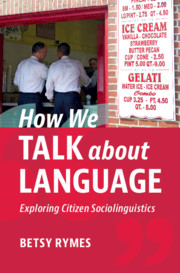Book contents
- How We Talk about Language
- How We Talk about Language
- Copyright page
- Contents
- Figures
- Tables
- Preface
- Introduction
- 1 Citizen’s Arrest!
- 2 Wonderment
- 3 Doing Citizen Sociolinguistics
- 4 Fomenting Wonderment and Critique
- 5 Citizen Sociolinguistics and Narrative
- 6 Acts of Citizen Sociolinguistics
- Conclusion
- References
- Index
3 - Doing Citizen Sociolinguistics
The Medium Is the Method
Published online by Cambridge University Press: 07 September 2020
- How We Talk about Language
- How We Talk about Language
- Copyright page
- Contents
- Figures
- Tables
- Preface
- Introduction
- 1 Citizen’s Arrest!
- 2 Wonderment
- 3 Doing Citizen Sociolinguistics
- 4 Fomenting Wonderment and Critique
- 5 Citizen Sociolinguistics and Narrative
- 6 Acts of Citizen Sociolinguistics
- Conclusion
- References
- Index
Summary
This chapter details how data are gathered, analyzed, and debated in a way which distinguishes citizen sociolinguistics from typical social science methodology, exemplifying and discussing several distinctions: The tools used to gather data are often misuses of other data tools like dialect surveys, language quizzes, or Google Translate; objective “accuracy” is less important than “likes” or popularity; sharing data is commonplace and necessary, given the importance of popularity for validity; transcripts are not kept in a locked drawer, but openly circulated; transcription of talk (often using phonetic spelling, emojis, or creative punctuation) is not “accurate” or “inaccurate” but is a form of interpretation in itself; making friends with research participants is not creepy overstepping but the essence of citizen sociolinguistic inquiry and a serendipitous way in which findings are disseminated. Validity, then, is built through participation in this community, rather than appeal to another knowledge base (such as published academic research). This chapter concludes with a short guide for fostering and exploring everyday conversations about language, whether fomented by curiosity and wonderment or critique and arrest.
- Type
- Chapter
- Information
- How We Talk about LanguageExploring Citizen Sociolinguistics, pp. 98 - 127Publisher: Cambridge University PressPrint publication year: 2020

